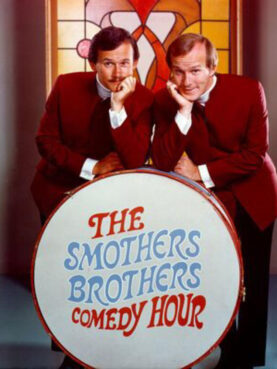
(RNS) — The death of Tommy Smothers of the Smothers Brothers touched me in a region of my soul that I had forgotten about.
Well, not entirely. I will get to that later.
The Smothers Brothers were part of the soundtrack of my youth in the 1960s. They were a folk duo, but the music always took a back seat to their comedy — with Dickie Smothers playing the straight man, the mature brother, to Tommy’s slightly addled, naive and petulant persona (“Mom always liked you best!”).
So, when Tom Smothers died this week at the age of 86, it sent me back to that 1960s place. His death saddened me, but the memories brought a smile to my lips.

Dick Smothers, left, and Tom Smothers of “The Smothers Brothers Comedy Hour,” circa 1967. (Courtesy photo)
The Smothers Brothers were significant television personalities — first, through “The Smothers Brothers Show,” a very short-lived sitcom (1965-1966), and then “The Smothers Brothers Comedy Hour” (1967-1969), which was a comedy and variety show. CBS showed a lot of, well, chutzpah, in scheduling the show opposite “Bonanza,” and the producers did a great job of bringing in such acts as the Buffalo Springfield, Cream, the Who — and, most famously and notoriously, the folk singer Pete Seeger.
That was what got the Smothers Brothers into trouble. They were not afraid of controversy, and Seeger’s appearance got them all the controversy that they might have wanted — and then some. Seeger sang his song “Waist Deep in the Big Muddy,” which seemed to be a parable about President Lyndon B. Johnson and the Vietnam War. “We were waist deep in the big muddy, and the big fool said to push on.”
Seeger had been blacklisted during the 1950s, and his appearance on “The Smothers Brothers Comedy Hour,” aired on Sept. 10, 1967, was to be his first appearance on television in 17 years. He refused to drop the last verse — the one that seemed to be about LBJ — and therefore, the network cut his performance of the song.
Fast-forward to just a few weeks ago. Some friends and I were in Austin, Texas, and we visited the LBJ Presidential Library. If you are in Austin, take my word for it — go. It is an amazing museum, and it heightened my respect for a president whose legacy has been soured by Vietnam, but whose life must be evaluated in its totality.
But there was one exhibit that transfixed and moved me: a letter sent to President Johnson, dated Oct. 31, 1967, after LBJ had announced that he would not seek reelection.
Mr. President:
During the past couple of years we have taken satirical jabs at you and more than occasionally overstepped our bounds. We disregarded the respect do the office and the tremendous burden of running the country because of our own emotional feelings regarding the war. We frequently disregarded the many, many good works and the progress the country has made under your administration.
We saw the television broadcast you made last night in behalf of the Democratic Party and Hubert Humphrey and were quite moved by your sincerity and by the content of the message. If the opportunity arose in this coming election to vote for you, we would.
Often an emotional issue such as the war makes people tend to over-react. Please accept our apology on behalf of the Smothers Brothers Comedy Hour for our over-reaction in some instances. Please know that we do admire what you have done for the country and particularly your dignity in accepting the abuse of so many people.
We are now working for the election of Hubert Humphrey and much of the enthusiasm we have for him is due to that broadcast of yours.
We just saw your message on Viet Nam and with all America, are pleased at your determine move to halt the bombing in an effort to achieve peace.
Respectfully,
Tom Smothers
Dick Smothers
Some might cynically wonder: Had the brothers received pressure from network bigwigs to “make nice”?
I don’t know. Frankly, I am not sure that it matters why people do good things, as long as they do them.
President Johnson, for his part, wrote back to the comedy duo:
It is part of the price of leadership of this great and free nation to be the target of clever satirists. You have given the gift of laughter to our people. May we never grow so somber or self-important that we fail to appreciate the humor in our lives.
There you have it. Three menschen. Two of them — Tom and Dick — expressing contrition and making repair. We call that in Hebrew, t’shuvah, repentance and return. And the third — LBJ — showed a level of graciousness that we might normally not associate with him.
Yes, Tom and Dick Smothers brought us a lot of laughter, and a small amount of controversy at a crucial time in American social history.
But, if you ask me, their greatest contribution to American culture was not in their humor, and certainly not in their music.
It was in the morally elegant way that they approached President Johnson, said that they were wrong and offered their support.
We need that kind of sincere soul-searching in the world today, and that is why I miss Tom Smothers. He, and his brother, offered it, and today, we must remember it and be grateful for it.
May his memory be a blessing.
